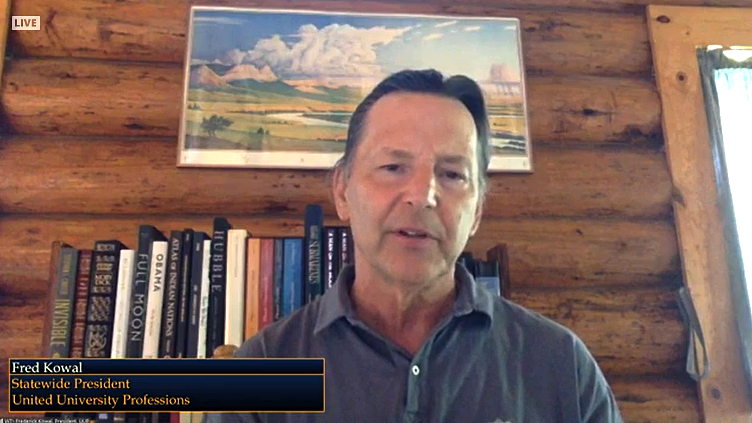
The three SUNY teaching hospitals and the essential employees working in them desperately need emergency funding if they are to continue providing care for COVID-19 patients, UUP President Fred Kowal told state lawmakers during a daylong Legislative hearing Aug. 12 on how the coronavirus pandemic affected New York’s hospitals.
“The lack of preparedness points out that there must be proper funding of the SUNY hospitals,” said Kowal, who added that the Legislature and Gov. Andrew Cuomo were responsible for a decade of underfunding to those hospitals. “It was clear we didn’t have the personnel necessary to treat the patients, and the patients we know are coming. Our union went so far as to purchase personal protective equipment for our health-care workers; had we not, more lives would have been lost.”
However, Kowal said that when UUP turned to the governor’s staff for help in procuring protective gear, the union got the help it needed. Nevertheless, Kowal testified, “I could tell you horror stories of literally trying to deal with mid-level businesses that were trying to find PPE anywhere in the country; anywhere in the world. This was a national catastrophe.”
The Senate and Assembly health committees and several other oversight committees are conducting hearings this week on the state’s response to the coronavirus pandemic. Public health advocates detailed horror stories at private and public hospitals during the height of the coronavirus pandemic in the spring, including accounts of doctors and nurses pleading for adequate protective gear as their administrations insisted they had ample supplies, and hospital staff being told not to wear face masks because masks might frighten patients.
Kowal asked lawmakers for three things in written testimony he submitted for the hearings: That SUNY hospitals receive enough funding to cover their unexpected equipment costs related to the coronavirus pandemic, including the cost of personal protective gear for front-line workers; that those front-line workers receive hazardous duty pay; and that the hospitals receive enough overall funding to sustain their day-to-day operations from the state, even as UUP and the state continue to press the federal government for emergency coronavirus relief funds.
High-risk for front-line workers
The three SUNY teaching hospitals—Downstate Health Sciences University Hospital in Brooklyn, Stony Brook University Hospital on Long Island, and Upstate Medical Center University Hospital in Syracuse—were primary treatment centers for COVID-19 patients, and in March, the governor designated Downstate as a COVID-19-only hospital. The three hospitals treated a total of several thousand COVID-19 patients, of which more than 500 died.
Several hospital staff workers also died of COVID-19, and in at least one—Stony Brook—a few hospital employees brought the virus home to their families, and some family members sickened and died. This occurred even though UUP provided hotel rooms to essential workers so that they would not have to travel home between shifts.
Given the terribly difficult conditions that SUNY hospital workers have faced, Kowal again urged lawmakers to support hazardous duty pay for them. Most major private hospitals in the New York City region have provided hazardous duty pay for their front-line workers.
Underfunding has consequences
Finally, as Kowal noted in his testimony, years of underfunding by the state meant that the hospitals quickly ran through their stockpiles of personal protective gear – the masks, gowns and head and foot coverings that help prevent the transmission of the virus from patient to caregiver and back to patient.
Instead, hospital staff resorted to the kind of desperate measures that would be expected in an underdeveloped setting, not a state with some of the finest hospitals in the world: plastic trash bags served as medical gowns, plastic bags as foot coverings. Face masks meant to be used once were instead sterilized and used over and again.
“With increasing pressure, we continue to urge the U.S. Senate to approve the HEROES Act, approved by the House of Representatives in May, an action that would go far in bridging a financial gap the governor is anticipating to be $15 billion or more,” Kowal told lawmakers. “Our hospitals were already financially weakened before the pandemic; the state has underfunded SUNY’s hospitals for years. State funding to our hospitals dropped by $515 million from 2011-12 to 2018-19. Cuts to federal Medicaid Disproportionate Share Hospital (DSH) Payments and the state’s DSH match have further diminished the hospitals’ finances.”
Seeking special revenue
UUP supports a special tax on the state’s ultra-rich residents as a source of additional revenue. The governor does not back such a step, but Senate Majority Leader Andrea Stewart-Cousins has recently joined with state Assembly Speaker Carl Heastie in supporting taxes on billionaires and the ultra-rich.
In meetings with dozens of lawmakers since the shutdown in March, lawmakers have repeatedly reassured UUP that they support the hospitals and will do everything possible to get additional funding for SUNY. Kowal ended his testimony on a similarly cooperative note of hope.
“I know by working together, we can create the positive change necessary to protect those who place their lives on the line to help COVID-19 patients heal and recover,” he wrote.
